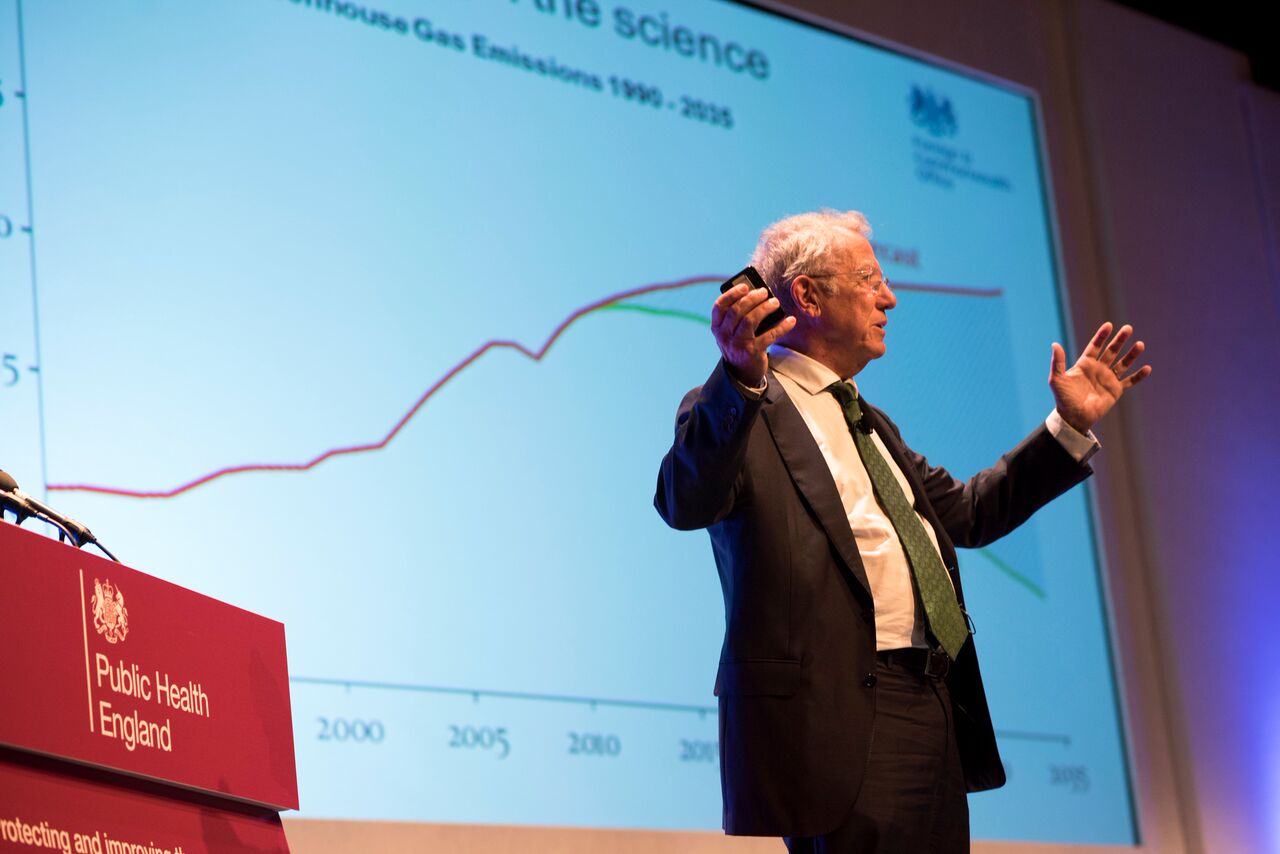
“Climate change is the biggest challenge that our civilisation has ever had to face up to.”
This was the opening statement from Sir David King when he delivered our inaugural Distinguished Lecture on climate change and planetary health at the recent PHE Annual Conference.
Sir David gave a powerful presentation that outlined the real risks to the planet and its populations from rising temperatures.
Baseline temperatures are moving upwards, with each month over the past 15 months being the hottest globally on record for the period.
He noted that there is a significant disparity in the level of emissions forecast between now and 2035 and the reduction in emissions we need to achieve in that timeframe; he also emphasised that climate change was linked to other planetary pressures such as deforestation, ocean acidification and potential food shortages which would also have direct implications for public health.
However, thanks to the tireless efforts of Sir David and others, a major step was taken in Paris last year when all countries agreed an action plan to limit global warming to well below 2°C.
And as the first country to introduce comprehensive legislation in 2008 with the Climate Change Act, the UK has undertaken a clear leadership role in ensuring that we, along with other nations, achieve this objective.
Sir David was also keen to emphasise some of the wider benefits from tackling climate change including sustainable economic development and positive public health benefits.
Public Health England, with its role to protect and improve the public's health, has a clear responsibility to address sustainable development and climate change.
Public health across the world and in the UK is closely linked to climate risks – from an increase in extreme events such as flooding and heatwaves to the threat of new diseases carried here from non-native species of mosquitoes, for example. The nature of the threats facing the UK were detailed in a report published in 2012 and are just as relevant today.
And of course, climate change poses a serious threat to both national and global economies that we know have a major impact on the wider determinants of health such as having a decent job and a safe and warm home.
https://www.youtube.com/watch?v=7c3d9BESXEY
Taking action
The UK employed 460,000 in the low carbon sector in 2013, which makes a significant contribution to our economy with a turnover of £120 billion a year.
However, as Sir David pointed out, it is the co-benefits of the transition to a low carbon economy that often drives countries to shift their investment – such as better health and air quality for their populations.
PHE’s strategy for 2016-2020 includes a commitment to highlighting the potential health, economic and global benefits of environmental sustainability to the public as part of the UK’s international commitments on sustainability, as well as a commitment to increasing understanding of the importance of environmental determinants of health including climate change.
PHE has been working steadily on the scientific basis for action on sustainability. Our scientists are actively engaging in the development of the second UK Climate Change Risk Assessment, we are partners with a number of institutions in partnerships researching the various impacts climate change may have and we are evaluating evidence of a number of interventions designed to mitigate the ill-effects of a changing climate – so that future policies are informed by the best available evidence.
Our Healthy People Healthy Places work programme has been examining the evidence for wider benefits from a range of local place based interventions to improve health and reduce health inequalities.
This includes active travel, the role of accessible green and blue space, the importance of well insulated affordable homes and evidence that sustainable nutrition is also healthier nutrition.
All of these interventions have the potential to impact the future sustainability of the planet as well as improvements in health and wellbeing.
Colleagues at PHE have collaborated across different departments and teams to develop advice and guidance. For example, our extreme events team regularly join forces with staff from the Healthy Places work programme to ensure that our immediate response to extreme events and longer term planning is informed by the latest thinking at both ends.
And colleagues from the medical entomology department have long collaborated with staff in the climate change team to consider the potential dangers that incoming disease vectors may pose to the UK in a changing climate.
We are also working to ensure our house is in order when it comes to sustainability. We are currently updating our own Sustainable Development Management Plan, through which we hope to engage PHE staff on how they can help the organisation become more sustainable as well as learn how their own actions can have an impact.
This plan will also help shape the planning for our new Science Hub in Harlow after 2020.
As well as contributing to action plans globally and at a cross-government level, PHE has been one of the key authors in the national Sustainable Development Strategy of the Health and Care System.
This strategy sets out an ambition for a sustainable health and care system by reducing carbon emissions, protecting natural resources, preparing communities for extreme weather events and promoting healthy lifestyles and environments.
Towards the end of his lecture, Sir David reiterated the point that climate change affects and involves every country and every individual. We must all work together in order to ensure a safe, healthy and sustainable world for future generations.
Our changing climate poses a threat to public health, but also great opportunity for creating cleaner, healthier environments.

1 comment
Comment by Anjalli posted on
Excellent talk. Thought provoking and depressing but also hopeful!
(Would have been more useful if the camera had focused on the presentation slides rather than Sir David so that viewers could see the graphs and figures he was referring to)